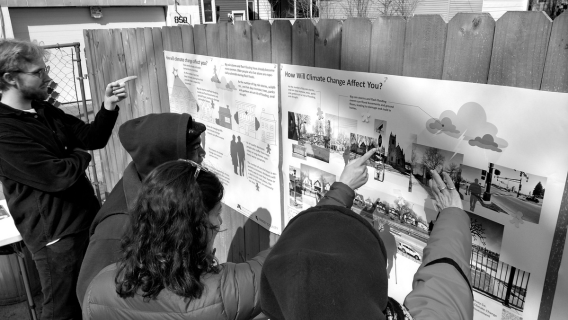After setting new climate goals in their 2040 comprehensive plan, Ramsey County staff wanted to take action right away. But what was the best way to build climate resilience across the second-most populous and most demographically diverse Minnesota county?
Building Internal Capacity for Climate Adaption
County staff turned to the Resilient Communities Project (RCP) for support researching climate policies that departments could apply to their daily work and, in 2018, RCP matched graduate students from the University of Minnesota’s Science, Technology and Environmental Policy capstone course with Ramsey County staff.
In their final RCP report, students identified adaptation strategies that could be incorporated into County programing, operations, and budgeting. They also applied best practices from other case studies to create a roadmap for the County to reach its climate goals.
“I have my job thanks to that RCP student report!” said Abi Phillips, Climate and Health Planner for Ramsey County. Phillips’ role was created in response to student recommendations to hire a dedicated resilience manager to facilitate cross-service-team collaboration.
Phillips began working for the County in March 2022 to develop a climate action plan as outlined in the county’s new climate strategic priorities.
After working with a consultant to collect preliminary engagement data to inform this work, she initiated another research partnership with RCP, which was supported by a Metropolitan Council matching grant. The resulting year-long partnership between Saint Paul–Ramsey County Public Health and RCP involved two projects that engaged 26 graduate students from the Humphrey School of Public Affairs and 8 from the Carlson School of Management.
“The fact there were so many students involved meant there were lots of ideas and perspectives in the program development,” Phillips said. “Students are allowed to be flexible and provocative in ways that consultants can’t. They pushed my work in new directions.”
Inclusive, Iterative Community Engagement
Five teams of students in Dr. Fernando Burga's PA 5145: Civic Engagement in Public Affairs course tackled a project on facilitating community engagement with populations most vulnerable to climate change. In addition, Carlson School of Management student projects with Saint Paul–Ramsey County Public Health focused on human resources development, to continue building capacity within the county to do the work outlined in the county’s Climate Equity Action Plan.
Gillian Greenberg was part of one student team in Burga’s class that developed and piloted a community engagement tool for talking with residents about climate impacts in the Rondo and West Side neighborhoods of Saint Paul. The team created a series of interactive posters and presented them during community events, inviting participants to reflect on how climate change impacts their lives.
“Pushing the boundaries on the innovative creative engagement side was most exciting to me,” said Greenberg. “We partnered with community organizations in both locations to do the pop-up pilots. It’s an important model because that network of community connection is how you build trust.”
Greenberg presented her team’s final poster at the Midwest Climate Resilience Conference in Duluth on October 25-27, 2023. She spoke with attendees during a networking session about how cities and counties can better engage their communities on climate change.
Phillips and her colleagues at Saint Paul–Ramsey County Public Health continue to use the engagement tool and student recommendations from their final report Iterative, Inclusive Engagement in Pursuit of Climate Resilience in Ramsey County. The County is also planning to hire a health educator to build relationships with community-based organizations that work with populations most vulnerable to climate change.
"The fact that Ramsey County integrates the lessons from RCP projects back into their work makes this partnership gratifying from a student perspective,” said Greenberg. “You can see your projects actually have an impact."
